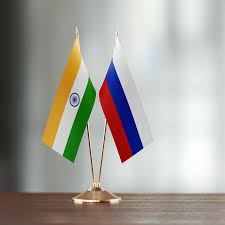
Syeda Khadija Rizwan
There are powerful alliances built on mutual trust, common ideals, and strategic objectives within the larger field of international relations. One such long-lasting alliance that has persisted for decades despite shifts in world politics is that between Russia and India. Now is a good time for India and Russia to deepen their connection in a variety of ways, to achieve shared prosperity and global leadership as the globe encounters new opportunities and challenges. A strong foundation of defense cooperation forms the basis of the Indo-Russian collaboration. “Reciprocal Logistics Support (ARLS) Agreement.” The “India-Russia Defense Industry Cooperation Conference” was opened by Russia and India. The conference will cover topics such as knowledge transfer, investment in India’s military industry, and defense industrial cooperation between Russia and India.
The Agreement on Reciprocal Logistics Support (ARLS) India and Russia are expected to conclude a mutual logistics agreement.
India and Russia are expected to review the setting up of joint ventures for manufacturing spares for Russian defense platforms in India. Purchase of the S-400 air-defense missile systems. India has already received three squadrons of the S-400 missile systems out of the five it had ordered in 2018.
Additionally, energy cooperation is essential to their relationship. India’s increasing energy demands match well with Russia’s abundant resources, including oil, gas, and nuclear energy. Projects like the Kudankulam Nuclear Power Plant highlight the potential for collaboration in this sector, enhancing energy security and technological development. KNPP is scheduled to have six VVER-1000 reactors built in collaboration with Atomstroyexport, the Russian state company, and Nuclear Power Corporation of India Limited (NPCIL), with an installed capacity of 6,000 MW of electricity.
While defense and energy have been crucial, there’s also room for cooperation in space exploration. By combining India’s expertise in satellite launches with Russia’s experience in space exploration, they can achieve more together. India-Russia space cooperation is largely limited to NavIC-GLONASS ground stations and Global Navigation Satellite Systems (GNSS)–Indian Regional Navigation Satellite System (IRNSS)
Furthermore, collaboration in science and technology can bring significant benefits. By sharing knowledge and resources, they can make advancements in areas like biotechnology, nanotechnology, and artificial intelligence, addressing common challenges and driving innovation.
Collaboration between India and Russia has been a key factor in the success of the vaccine production facility of Bharat Immunologicals and Biologicals Corporation Ltd at Bulandshahr in Uttar Pradesh. Collaboration in Materials science has led to the establishment of the International Advanced Centre for Powder Metallurgy and New Materials (ARCI) set up at Hyderabad. High-Performance Computing was one of the major thrust areas for collaboration. A significant project under its purview pertains to the collaboration between the Centre for Development of Advanced Computing (C-DAC) and the Institute for Computer-Aided Design (ICAD) of the Russian Academy of Science in the area of High-Performance Computing (HPC).
Remotely Operated Unmanned Submersible (ROSUB) was also jointly developed by the National Institute of Ocean Technology (NIOT), Chennai, and the Experimental Design Bureau of Oceanological Engineering (EDBOE), Russian Academy of Sciences (RAS), Moscow. In the emerging technologies domains, both sides in 2020 and 2021, with the help of the Russian Academy of Science (RAS), Russia India Network of Universities (RIN) and DST/CSIR/IIT/IISER institutes have conducted a series of scientific webinars in Data Analytics, AI, Nano-technology, New Materials, Advanced Manufacturing, Quantum Technologies, Interdisciplinary Cyber Physical Systems, Marine Bio-diversity & Blue economy, Waste to Wealth technologies and Disaster Management Technologies etc.
Apart from these areas, cultural exchange plays a vital role in their relationship. Both countries appreciate each other’s cultural heritage, fostering a sense of solidarity. Events like the Festival of India in Russia and Russian Film Days in India promote mutual understanding and strengthen their bond.
Russian-Indian cultural interaction covers a wide range of areas. Music, dance, and theater groups are being exchanged, film festivals, art and photo exhibitions, and various thematic seminars and conferences are organized. Cross-cultural festivals are held annually.
Representatives of the Russian film industry regularly take part in festivals in India, including the most prestigious of them – the Indian International Festival in Goa, the Indian filmmakers – in Russian film festivals, including the Moscow International Film Festival. The Indian Festival in Moscow and the Days of Indian Culture in the Astrakhan Region are held annually.
In conclusion, the Indo-Russian partnership is significant as they face a changing world. By deepening their engagement and embracing innovation, they can inspire others with their shared vision and make a positive impact on global affairs. It’s time to reaffirm their commitment to this enduring friendship and work together for a brighter future.
Writer is Student of Defense and Diplomatic studies and Studying at Fatima Jinnah Woman University.She Can be reached at [email protected]






